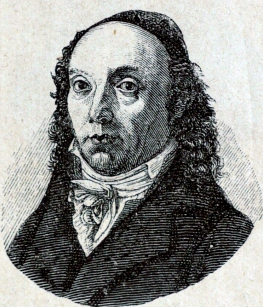Karl Daub on:
[Wikipedia]
[Google]
[Amazon]
 Karl Daub (20 March 176522 November 1836) was a German
Karl Daub (20 March 176522 November 1836) was a German
 Karl Daub (20 March 176522 November 1836) was a German
Karl Daub (20 March 176522 November 1836) was a German Protestant
Protestantism is a branch of Christianity that follows the theological tenets of the Protestant Reformation, a movement that began seeking to reform the Catholic Church from within in the 16th century against what its followers perceived to b ...
theologian
Theology is the systematic study of the nature of the divine and, more broadly, of religious belief. It is taught as an academic discipline, typically in universities and seminaries. It occupies itself with the unique content of analyzing the ...
.
Biography
He was born at Kassel. He studied philosophy,philology
Philology () is the study of language in oral and written historical sources; it is the intersection of textual criticism, literary criticism, history, and linguistics (with especially strong ties to etymology). Philology is also defined as th ...
and theology
Theology is the systematic study of the nature of the divine and, more broadly, of religious belief. It is taught as an academic discipline, typically in universities and seminaries. It occupies itself with the unique content of analyzing the ...
at Marburg
Marburg ( or ) is a university town in the German federal state (''Bundesland'') of Hesse, capital of the Marburg-Biedenkopf district (''Landkreis''). The town area spreads along the valley of the river Lahn and has a population of approxima ...
in 1786, and eventually (1795) became professor ordinarius of theology at the University of Heidelberg
}
Heidelberg University, officially the Ruprecht Karl University of Heidelberg, (german: Ruprecht-Karls-Universität Heidelberg; la, Universitas Ruperto Carola Heidelbergensis) is a public research university in Heidelberg, Baden-Württemberg, ...
, where he remained until his death. He became rector of the university in 1816 and 1824. He was married in 1801 to Sophie Wilhelmine Charlotte Blum.
Daub was one of the leaders of a school which sought to reconcile theology and philosophy, and to bring about a speculative reconstruction of orthodox dogma
Dogma is a belief or set of beliefs that is accepted by the members of a group without being questioned or doubted. It may be in the form of an official system of principles or doctrines of a religion, such as Roman Catholicism, Judaism, Isla ...
. In the course of his intellectual development, he came successively under the influence of Immanuel Kant
Immanuel Kant (, , ; 22 April 1724 – 12 February 1804) was a German philosopher and one of the central Enlightenment thinkers. Born in Königsberg, Kant's comprehensive and systematic works in epistemology, metaphysics, ethics, and ...
, Friedrich von Schelling and G. W. F. Hegel
Georg Wilhelm Friedrich Hegel (; ; 27 August 1770 – 14 November 1831) was a German philosopher. He is one of the most important figures in German idealism and one of the founding figures of modern Western philosophy. His influence extends a ...
, and on account of the different phases through which he passed he was called the Talleyrand of German thought. There was one great defect in his speculative theology: he ignored historical criticism. His purpose was, as Otto Pfleiderer
Otto Pfleiderer (1 September 1839 – 18 July 1908) was a German Protestant theologian. Through his writings and his lectures, he became known as one of the most influential representatives of liberal theology.
Biography
Pfleiderer was born at S ...
says,
"to connect the metaphysical ideas, which had been arrived at by means of philosophical dialectic, directly with the persons and events of the Gospel narratives, thus raising these above the region of ordinary experience into that of the supernatural, and regarding the most absurd assertions as philosophically justified. Daub had become so hopelessly addicted to this perverse principle that he deduced not only Jesus as the embodiment of the philosophical idea of the union of God and man, but also Judas Iscariot as the embodiment of the idea of a rival god, or Satan."The three stages in Daub's development are clearly marked in his writings. His ''Lehrbuch der Katechetik'' (1801) was written under the spell of Kant. His ''Theologumena'' (1806), his ''Einleitung in das Studium der christlichen Dogmatik'' (1810), and his ''Judas Ischarioth'' (2 vols., 1816, 2nd ed., 1818), were all written in the spirit of Schelling, the last of them reflecting a change in Schelling himself from theosophy to positive philosophy. Daub's ''Die dogmatische Theologie jetziger Zeit oder die Selbstsucht in der Wissenschaft des Glaubens'' (1833), and ''Vorlesungen über die Prolegomena zur Dogmatik'' (1839), are Hegelian in principle and obscure in language. He died in
Heidelberg
Heidelberg (; Palatine German language, Palatine German: ''Heidlberg'') is a city in the States of Germany, German state of Baden-Württemberg, situated on the river Neckar in south-west Germany. As of the 2016 census, its population was 159,914 ...
.
Legacy
Søren Kierkegaard is notable among those who were prominently influenced by Daub's thought. In ''From the Papers of One Still Living'', Kierkegaard wrote:There must come a moment, I say, when as Daub observes, life is understood backward through the idea…Some years later, Kierkegaard expanded on this idea in his journal, in a passage that is often quoted or paraphrased:
Philosophy is perfectly right in saying that life must be understood backwards. But then one forgets the other claim – that it must be lived forwards.
References
;Attribution *External links
* {{DEFAULTSORT:Daub, Karl 19th-century German Protestant theologians 19th-century German philosophers 1765 births 1836 deaths 19th-century German male writers German male non-fiction writers Hegelian philosophers Heidelberg University faculty German Freemasons